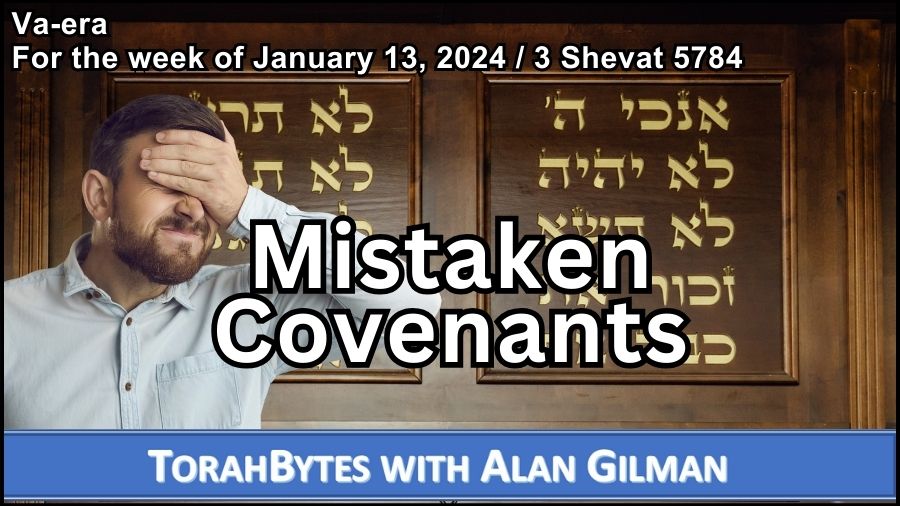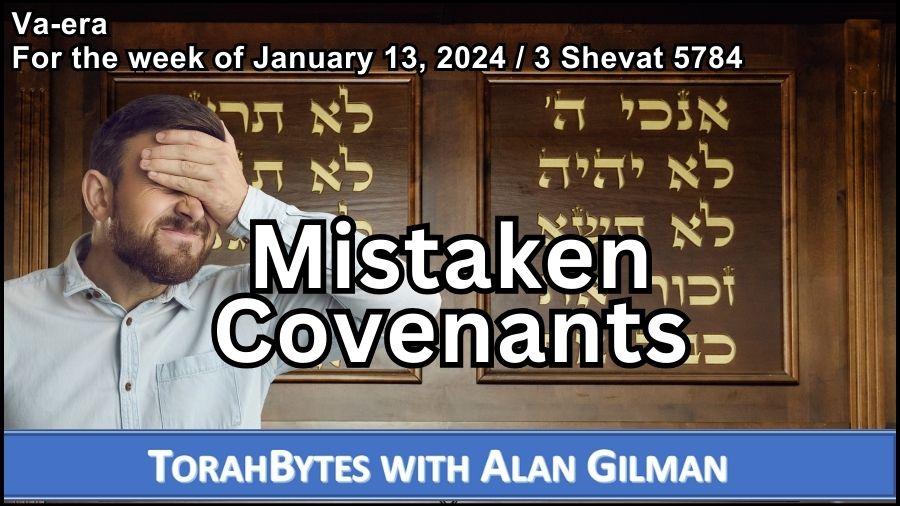
Mistaken Covenants
For the week of January 13, 2024 / 3 Shevat 5784

Va-era
Torah: Shemot/Exodus 6:2 – 9:35
Haftarah: Ezekiel 28:25 – 29:21
Moreover, I have heard the groaning of the people of Israel whom the Egyptians hold as slaves, and I have remembered my covenant. (Shemot/Exodus 6:5)
I am currently immersed in the subject of “supersessionism,” also called “replacement theology” or “fulfilment theology.” Supersessionism is the historic theological belief system that the Israel of the Old Testament has been superseded by the Church of the New Testament. This viewpoint emerged likely as early as the first century and has been the dominant Christian viewpoint until today. Supersessionism views the Church as the New or True Israel, most often appropriating various Old Testament characters and principles when deemed suitable for its purposes.
In the past few centuries there have been some alternate viewpoints that find some room somewhere for an ongoing understanding of Israel, including or excluding the Land of Israel. But it’s only since the Holocaust that theologians have more widely attempted to seriously rethink this default position. It’s tragic that it took six million Jews to be exterminated by the Nazis in the heart of Christian Europe to prompt a rethink. It’s doubly tragic that it took circumstances to drive theologians back to the Bible. And even more tragic that so many Christians continue to view the Bible through a supersessionist lens. Forgive me if it’s my idealism that leads me to think that Paul’s letter to the Romans alone should be a sufficient antidote to supersessionism. One needs to do some interesting theological gymnastics to explain away, “As regards the gospel, they are enemies for your sake. But as regards election, they are beloved for the sake of their forefathers. For the gifts and the calling of God are irrevocable” (Romans 11:28-29). Whatever antagonistic role some were playing, God’s perspective on the Jewish people as a whole is clear: they are “beloved,” and that which God bestowed upon them through Abraham, Isaac, and Jacob is irrevocable.
This is a huge subject, but for now, I would like to demonstrate how this week’s parsha (weekly Torah reading portion) helps clarify a confusion that often leads to supersessionism. In these early chapters of the second book of the Torah, we find Israel suffering as slaves in Egypt. God responds to their cries, by saying, “I have heard the groaning of the people of Israel whom the Egyptians hold as slaves, and I have remembered my covenant” (Shemot/Exodus 6:5). But what covenant? Many Christians assume it’s the “Old Covenant.” The problem is that what the New Testament would later call the Old Covenant had not yet been established. The covenant referenced here is the one God gave to Abraham, his son Isaac, and his grandson Jacob centuries earlier. God had changed Jacob’s name to Israel, the name by which the nation would be called. This covenant unconditionally committed God to Israel’s peoplehood, land, and role in God’s purposes.
Israel’s time in Egypt was part of God’s plan. The land of Canaan would one day be theirs, but their transition from being a migrant clan to a two-million strong nation was to happen in the pressure cooker of a foreign land. I wonder how often, especially when their originally favored status collapsed into servitude, that the people thought the covenant of peoplehood and land was nothing but a legend—fantasy might be the better word. But God had not forgotten. At the right time, he delivered them on the basis of that covenant.
The covenant with their forefathers would not be the only covenant God would make with the people of Israel, however. God’s rescuing them led to the establishment of a second covenant through Moses at Mt. Sinai. This second covenant was conditional upon Israel’s adherence.
As it turned out, the people of Israel failed to uphold their covenant obligations, resulting in serious negative consequences. Yet, the effects of the broken Sinai covenant were not to have the final word in Israel’s history. The original unconditional covenant set up, what I like to term, a “dilemma, for God. God worked out a way to punish Israel for disobedience under Sinai without undermining the unconditionality of the earlier covenant. This is why throughout the Scriptures there’s a tension between God’s determination to chastise Israel and his commitment to never fully reject them.
It is this dilemma that results in the New Covenant as promised through the prophet Jeremiah (see Jeremiah 31:31-34) and established by the Messiah (see Luke 22:20). Where people tend to get confused is over what is the old thing of which the New Covenant is the new thing. By calling the Hebrew Scriptures the Old Testament, “testament” being another word for covenant, people understandably get the impression that the Hebrew Scriptures as a whole should be viewed as past its expiry date, so to speak. The only book of the Bible that explicitly addresses this matter is the Book of Hebrews. However, Hebrews is asserting the obsolescence, not of God’s covenantal relationship with the people of Israel, but the Sinai covenant as a system administered by the Levitical priesthood and centered in the Temple in Jerusalem. The relationship of the ongoing nature of much of the contents of the Sinai covenant to the obsolescence of the Levitical system is a topic for another time.
Failure to differentiate these two covenants contributed to the view that the destruction of Jerusalem in AD 70 along with the later exile of the great majority of the Jewish people as God’s complete rejection of his covenantal relationship with Israel.
But thankfully, the God of Israel is a God of his word. In fact, the reason why anyone can trust him today is due to his ongoing covenantal faithfulness to the descendants of Abraham, Isaac, and Jacob.
Scriptures taken from the English Standard Version